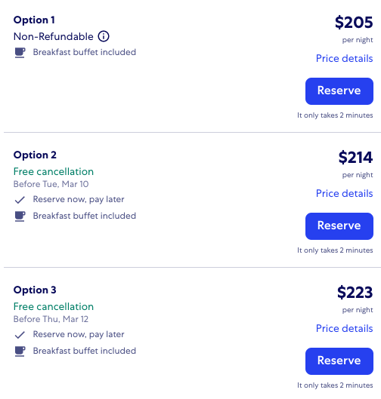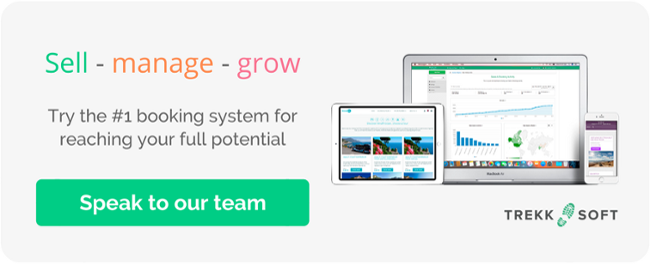In the last few weeks, the tourism industry has been hit hard by the outbreak of COVID-19. Not only have conferences like ITB Berlin and Arival been cancelled, but we’ve also seen bookings sharply decline and cancellations skyrocket.
Knowing that we will have a difficult few months ahead of us, we wanted to share our two cents on how you can safeguard your business in the coming months.
Review your cancellation policies
If you do not already have a cancellation policy in place, it’s time to write one. The current industry standard, based on what major OTAs recommend, is to allow a full refund for cancellations made 24 hours before departure time.
With a drastic increase in cancellations due to the recent outbreaks, we’re starting to see that such flexibility comes at a cost.
To properly protect your business, we recommend that you review your existing policies and consider the following factors:
1. Prices of your tours can determine how flexible you are with refunds and cancellations

If we look at the hotel industry, cheapest rooms are usually non-refundable. What’s interesting in this screenshot is that the mid-range price includes the standard cancellation of 4 days before a booking, while the most expensive option allows for cancellations up to 2 days before a booking.
How can you tier your prices such that your cheapest tours can be cancelled for free and your premium tours require a cancellation fee?
2. Cancellation terms should depend the resources your tours or activities require
The more expensive and resource intensive your services cost, the less flexible your cancellation policies should be.
To recoup your costs on a cancellation, you could also charge a cancellation fee instead of giving a full refund, or only offer for the booking to be rescheduled instead of allowing cancellations at all.
3. Timeframe for cancellations and refunds
How much time will it take for you to secure a new booking if a tour is cancelled? Your refund period should be adjusted to give yourself enough time to secure a new booking.
You could offer free cancellations up to 24 hours, 48 hours or 72 hours of departure.
Alternatively, you can offer free cancellation up to 24 hours after the booking, or free cancellation up to 7 days before departure.
4. Cancellation procedure
In your cancellation policy, remember to state the steps customers should take to cancel a booking with you. Also include contact details such as a phone number or email address.
Here are some examples of cancellation policies from Airbnb Experiences, Tours By Locals, VAWAA (particularly useful if you run very personal multi-day tours).
Reviewing cancellation policies with 3rd parties
Resellers and OTAs
The default cancellation policy for most OTAs is to offer a full refund when cancellation takes place 24 hours before the tour.
If this is not consistent with the cancellation policy you offer on your own website, we recommend that you change it so that your terms are consistent across all your sales channels.
Your suppliers
If you work with 3rd party suppliers who either offer you tours to sell or rent out resources like buses and boats to run your tours, what is the arrangement you have with them around cancellations and refunds? Can you negotiate for something more flexible?
In this time of crisis, it is important to work closely with your business partners and suppliers to find solutions that work for both companies.
Protecting your profits
In times of crisis, it is normal for companies to respond with knee jerk reactions to protect their livelihoods. What we hope for you is that measures are also taken to protect your bottom line and also the long-term endurance of your business.
Reducing cancellations and refunds
An increase in cancellations means that you lose the money that you’ve charged a customer. A drastic increase in refunds can severely affect your cash flow. To avoid this situation, here are some alternatives to refunds.
- Issue a voucher that’s valid for 1or 2 years (Note that EU companies need to issue 5 year validity based on the new Consumer Protection (Gift Vouchers) Act 2019)
- Reschedule the tour to a different date
- Transfer the booking to someone else who might be visiting in the future
Maintaining your prices instead of lowering them
A common thing you might see your competitors doing is lowering their prices to attract more bookings. In our many revenue management webinars, we’ve cautioned how this is a slippery slope. It can cheapen the value of the services you provide and end up in an unnecessary price competition instead.
An alternative strategy here is to focus on your domestic and local markets. Just because tourists are not flying in from around the world, does not mean your local market is not interested in what you offer.
We expect many people to stay home as well seeing as they cannot travel abroad. Update your in-destination marketing strategies by changing up your content for a more local audience to tap into your local market.
You can also join our upcoming webinar to learn how to price your tours in times like this >>
Focus on existing customers who have not cancelled their trips
Despite the crisis, you will still find customers arriving at your store front from all over the world. Take this opportunity to deliver a truly good service as this your most profitable segment at the moment.
Consider as well, all the different ways you can increase their booking value. Can you add on a transfer service or a food tour for a slight discount? Can you upsell customers on a top hotel at an affordable price while earning a referral commission?
This is the time to draw on your knowledge of your customers to provide them with an experience that’s truly rewarding.
Partner with local businesses to create new products
In Shannon Stowell’s email to ATTA members, he emphasised the importance of the industry coming together to learn and support one another through these challenging times. His sentiment is one that we cannot ignore.
Coming together to collaborate and share valuable business connections is one way to create different products and services to bring in more bookings. What services can you combine to create a unique experience? Perhaps a local yoga class and a boat ride? A yoga class on a boat? Sunrise yoga plus a vegan breakfast and a snorkel in one morning?
Go create an experience people truly cannot miss, and collaborate with the right partners to make it happen.
Want to learn more about TrekkSoft's omni-channel booking and management system?




